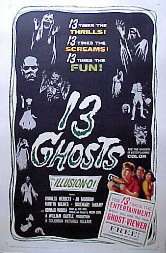13 Ghosts
13 Ghosts is a 1960 American supernatural horror film produced and directed by William Castle, written by Robb White, and starring Jo Morrow, Rosemary DeCamp, Martin Milner, Donald Woods, Charles Herbert,[3] and experienced character actress Margaret Hamilton. 13 Ghosts was released in 1960 on a double bill with either 12 to the Moon, The Electronic Monster, or Battle in Outer Space, depending on the film market.
| 13 Ghosts | |
|---|---|
 Theatrical release poster | |
| Directed by | William Castle |
| Produced by | William Castle |
| Written by | Robb White |
| Starring | |
| Music by | Von Dexter |
| Cinematography | Joseph F. Biroc |
| Edited by | Edwin H. Bryant |
| Distributed by | Columbia Pictures |
Release date |
|
Running time | 84 minutes[1] |
| Country | United States |
| Language | English |
| Box office | $1.5 million (US/Canada)[2] |
Plot
When occultist uncle Dr. Plato Zorba wills a huge ramshackle house to his nephew Cyrus and his impoverished family, they are shocked to find the house is haunted. Their furnished residence comes complete with a creepy housekeeper, Elaine, plus a fortune in buried treasure and 12 horrifying ghosts. His family soon discovers that these spirits include a wailing lady, clutching hands, a fiery skeleton, an Italian chef murdering his wife and her lover in the kitchen, a hanging lady, an executioner holding a severed head, a fully grown lion with its headless tamer, a floating head (presumably belonging to the tamer), as well as that of Plato Zorba himself, all held captive in the eerie house looking for an unlucky thirteenth ghost to free them. Dr. Zorba leaves a set of special goggles, the only way of seeing the ghosts.
However, there is someone in the house who is also looking for the hidden fortune in money and is willing to kill for it. The villain turns out to be the lawyer, Benjamen Rush. He attempts to kill Cyrus' son, Buck, using the falling bed canopy Rush had used to kill Dr. Zorba, whose ghost catches him in the act, driving the terrified Rush to his death in the bed just as Buck escapes. Rush becomes the 13th ghost, and the ghosts disappear. The next morning, Cyrus and his family count the discovered money, Buck keeps the mask used by Benjamen Rush to scare Buck's older sister, Medea, and they decide to stay, with a fortune in cash. At the end of the film the special goggles are blown into smithereens by an unknown force, witnessed by Elaine, who gets a broom and permits herself a small enigmatic smile.
Cast
- Charles Herbert as Buck Zorba
- Jo Morrow as Medea Zorba
- Rosemary DeCamp as Hilda Zorba
- Martin Milner as Benjamen Rush
- Donald Woods as Cyrus Zorba
- Margaret Hamilton as Elaine Zacharides
- John van Dreelen as Van Allen
Illusion-O
As with several of his more famous productions, Castle used a gimmick to promote 13 Ghosts. Audience members were given a choice: the "brave" ones could watch the film and see the ghosts in 3D.
In the theaters most scenes were black-and-white, but scenes involving ghosts were shown in a "process" dubbed "Illusion-O." The filmed elements of the actors and the sets — everything except the ghosts — had a blue filter applied to the footage, while the ghost elements had a red filter and were superimposed over the frame.[4] Audiences received viewers with red and blue cellophane filters. Unlike early 3D glasses, where one eye is red and the other is cyan or blue, the Illusion-O viewer required people to look through a single color with both eyes. Choosing to look through the red filter intensified the images of the ghosts, while the blue filter "removed" them.[5]
Reception
Howard Thompson of The New York Times called the film "a simple, old-fashioned haunted house yarn" that "would be a lot better off without this gimmick."[6] Variety wrote, "The idea is sound and exploitable, but the execution doesn't fully come off," explaining the ghosts "lack personality and aren't frightening, so that there isn't sufficient tension in the sequences during which the 'ghost viewer' comes into play."[7] The Monthly Film Bulletin called it "a workmanlike but not very frightening horror film ... the ghosts, which are a dull red colour, are far less effective when witnessed than when their presence is merely suggested, especially when their viewability depends on a process as unremarkable as Illusion-O."[8]
Remake
The film was remade in 2001 with a spelled-out title, Thirteen Ghosts, and was directed by Steve Beck. Like the original, the film was distributed by Columbia Pictures, except in the United States and Canada, where it was distributed by Warner Bros. Pictures.[9]
References
- "13 Ghosts (A)". British Board of Film Classification. May 16, 1980. Retrieved July 27, 2016.
- "Rental Potentials of 1980", Variety, 4 January 1981 p 47. Please note figures are rentals as opposed to total gross.
- Joe Jordan (June 30, 2014). Showmanship: The Cinema of William Castle. BearManor Media. pp. 231–. GGKEY:7X0U2FR3T69.
- Law, John W. (2000). Scare tactic : the life & films of William Castle. San Jose [Calif.]: Writers Club Press. pp. 81–82. ISBN 0595095445. OCLC 60884288.
- McGee, Mark Thomas (2001). Beyond ballyhoo : motion picture promotion and gimmicks. Jefferson, N.C.: McFarland. p. 113. ISBN 9780786411146. OCLC 47037541.
- Thompson, Howard (August 6, 1960). "Screen: Haunted House". The New York Times: 9.
- "13 Ghosts". Variety: 9. June 29, 1960.
- "13 Ghosts". The Monthly Film Bulletin. 28 (324): 12. January 1961.
- Castle, William (1976). Step right up!: ... I'm gonna scare the pants off America. New York City, New York, US: G. P. Putnam's Sons. ISBN 9780399114700. OCLC 1974189. Retrieved March 30, 2012.